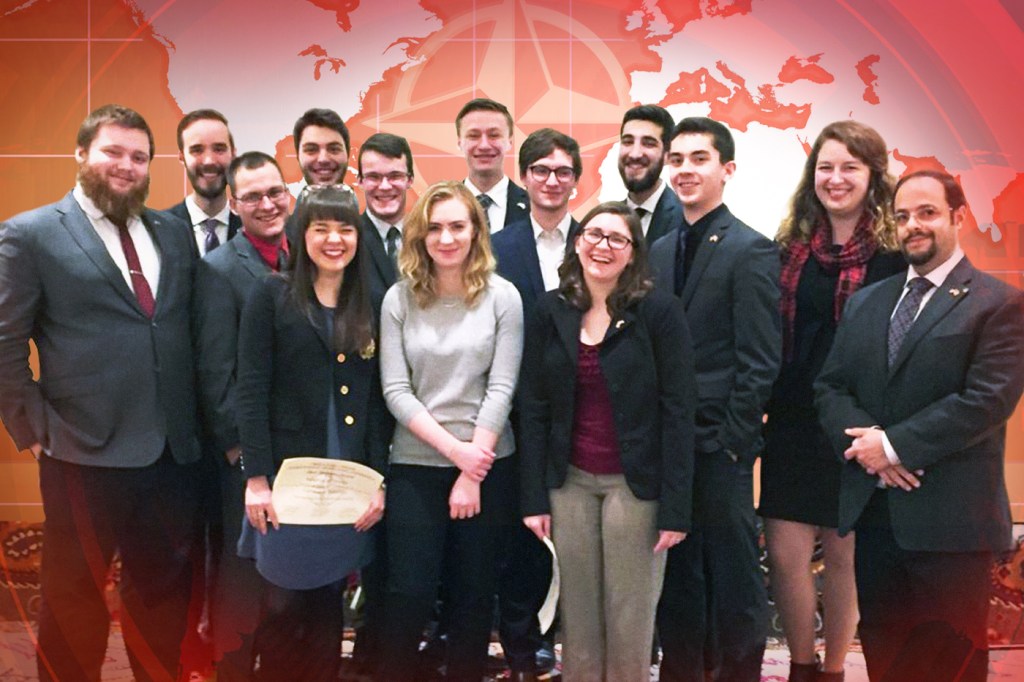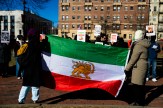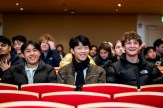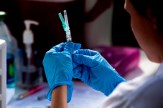Northeastern’s Model NATO team can’t be stopped

A team of Northeastern students placed first at the 31st annual International Model NATO Conference in Washington, D.C., earlier this month, besting more than two dozen delegations from higher education institutions from Belgium, Canada, the U.S., and the United Kingdom.
At the conference, each student team represented a pre-assigned member state of NATO or the Euro-Atlantic Partnership Council. The proceedings mirrored those of the 67-year-old intergovernmental military alliance, with students sitting on committees and discussing, debating, and writing resolutions on today’s most pressing global issues.
Northeastern, which represented Albania and Norway, has a long history of conference success. This year, the university’s Norway delegation placed first, marking the fifth consecutive conference in which a Northeastern team has been named the winner. The Albania delegation placed third. Of the 21 Northeastern students who competed, 20 won best delegation, committee leadership, or outstanding chair awards.
I entered college with U.S.-centric interests, but Model NATO has opened my eyes to the international world.”
— Shane Godek, SSH’19
Philip D’Agati, Model NATO team advisor and associate teaching professor in the Department of Political Science, attributed the impressive performance to months of intense training. To prepare for the competition, students spend several hours per week reading policy statements, writing mock resolutions, and debating the issues in the university’s Model NATO class or club.
“It is about mentorship and dedication and being part of a university that truly values experiential education with a global focus,” D’Agati said, explaining the long-running winning streak. “Put all of that together and you have a well-oiled machine that can foster great delegates year after year.”
The Model NATO team is one component of the university’s International Relations Council, a student group for those interested in foreign policy, international affairs, and effective debate. Through participation in interactive simulations of NATO as well as the United Nations and the League of Arab States, IRC members discover the challenges of international diplomacy while developing strong public speaking and negotiation skills.
Zach Badore, SSH’18, is a prime example. The third-year political science major joined the Model NATO club in his freshman year with an eye toward applying to law school and entering the Judge Advocate General’s Corps. Now he’s the president of the club, a practiced public speaker with a passion for international law and a much improved foreign policy acumen.
“Model NATO forces you to think on your feet and adapt to other people,” said Badore, who was named best delegate on Norway’s military committee, where he led a discussion of NATO’s Readiness Action Plan. “It hasn’t changed what I want to do with my career, but it has improved my capacity to get ready for practicing U.S. law in another country.”
It is about mentorship and dedication and being part of a university that truly values experiential education with a global focus.”
— Model NATO team advisor Philip D’Agati
Shane Godek, SSH’19, marked his first appearance at the conference by winning a committee leadership award for his work as Norway’s delegate on the North Atlantic Council. In an interview a few days later, he noted that his experience in the Model NATO club has expanded his career ambitions.
“I entered college with U.S.-centric interests, but Model NATO has opened my eyes to the international world,” said Godek, a second-year political science and economics combined major. “Now I’m more receptive to a career with an international scope.”





